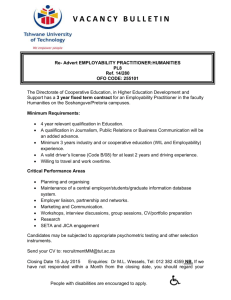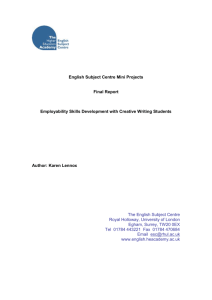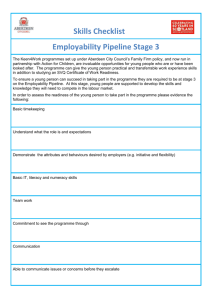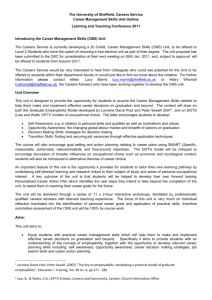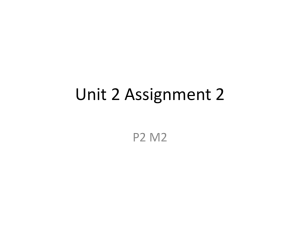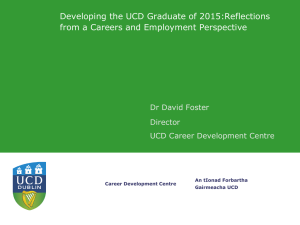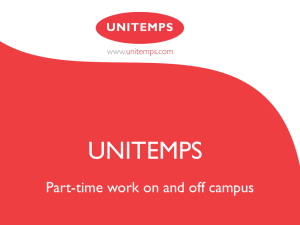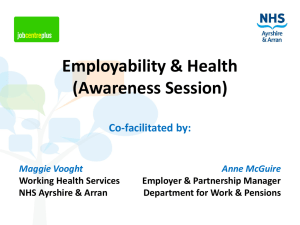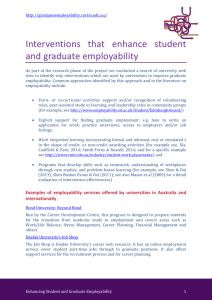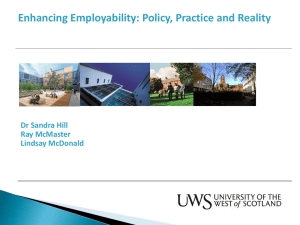Arts and Humanities case study
advertisement
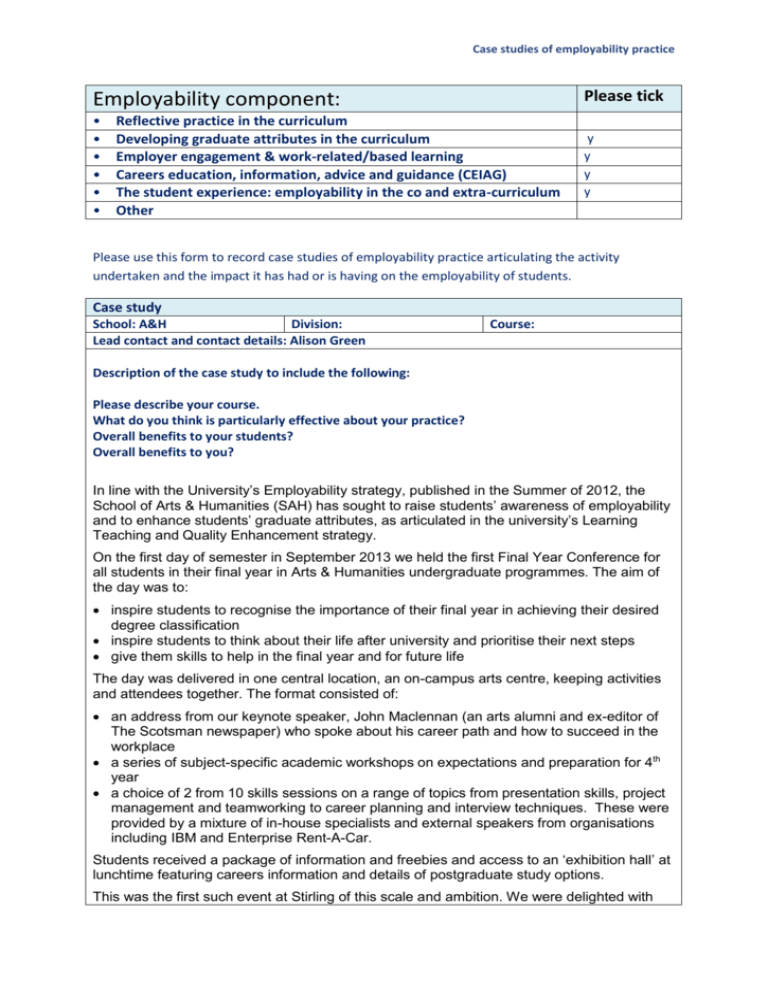
Case studies of employability practice Employability component: Please tick • • • • • • y y y y Reflective practice in the curriculum Developing graduate attributes in the curriculum Employer engagement & work-related/based learning Careers education, information, advice and guidance (CEIAG) The student experience: employability in the co and extra-curriculum Other Please use this form to record case studies of employability practice articulating the activity undertaken and the impact it has had or is having on the employability of students. Case study School: A&H Division: Lead contact and contact details: Alison Green Course: Description of the case study to include the following: Please describe your course. What do you think is particularly effective about your practice? Overall benefits to your students? Overall benefits to you? In line with the University’s Employability strategy, published in the Summer of 2012, the School of Arts & Humanities (SAH) has sought to raise students’ awareness of employability and to enhance students’ graduate attributes, as articulated in the university’s Learning Teaching and Quality Enhancement strategy. On the first day of semester in September 2013 we held the first Final Year Conference for all students in their final year in Arts & Humanities undergraduate programmes. The aim of the day was to: inspire students to recognise the importance of their final year in achieving their desired degree classification inspire students to think about their life after university and prioritise their next steps give them skills to help in the final year and for future life The day was delivered in one central location, an on-campus arts centre, keeping activities and attendees together. The format consisted of: an address from our keynote speaker, John Maclennan (an arts alumni and ex-editor of The Scotsman newspaper) who spoke about his career path and how to succeed in the workplace a series of subject-specific academic workshops on expectations and preparation for 4th year a choice of 2 from 10 skills sessions on a range of topics from presentation skills, project management and teamworking to career planning and interview techniques. These were provided by a mixture of in-house specialists and external speakers from organisations including IBM and Enterprise Rent-A-Car. Students received a package of information and freebies and access to an ‘exhibition hall’ at lunchtime featuring careers information and details of postgraduate study options. This was the first such event at Stirling of this scale and ambition. We were delighted with Case studies of employability practice the high rate of student engagement, measured through high attendance and active participation. The feedback speaks for itself: “motivational”; “I loved the whole day” The project was conceived by Alison Green, Deputy Director of Learning & Teaching, following discussions with colleagues in the Psychology department who run a similar event for their students on a small scale. The proposed scale of the conference was unprecedented, with almost 600 students invited. By approaching the project in this way, it was felt that it would have greater impact by pooling resources to achieve good quality content for students. The project was approved in April 2013 by the SAH. No external funding was available but a small project team was established. Staff from the Careers Development Centre (CDC) provided Careers advisors and invited external speakers to deliver skills sessions; SAH administrators arranged all the facilities and bookings, and Alison Green oversaw the project. The collaboration between CDC and SAH made this event possible as neither body had the expertise to carry through the project alone. In addition, close ties with alumni and external organisations provided expert skills training, while exposing students to potential employers and experienced professionals. Academic staff supported the event and provided teaching sessions. Their support and commitment demonstrated to students that the conference was of value and important to their University careers. Due to the tight timescale for communicating the event to students before they left for the summer break, the marketing of the conference posed challenges. We were delighted that intensive publicity campaigns before and during the summer break resulted in attendance by approximately two-thirds of the target audience when they returned to campus in September. The Final Year Conference has become an annual fixture and we aim to ensure it remains aspirational and a key event in the academic calendar. It has raised the profile of employability and allows us to build a further programme of smaller events for first, second and third year undergraduates, ultimately leading to attendance and participation at the Conference. Other areas of the University have shown interest in running similar events and we look forward to sharing our experiences with colleagues and supporting their activities where possible. One student commented: “I think that the workshops should be available to students from other divisions and schools too, as the workshops offered are on universal skills that everybody should learn”. Through being able to communicate to the student body as one, at this critical time in their academic career, we hope we will see better student engagement by final year undergraduates. Anecdotal evidence would suggest this is the case following this year’s event. This event was an opportunity for a number of employers to come to the University and see the commitment to employability we have. The conference’s core aims are intended to help students plan their next steps after graduation well in advance of completing their degree, and in particular to advertise the range and scope of options available to them. In this way we expect our Arts & Humanities graduates to be better prepared to contribute positively to their communities and wider society, and to make best use of their University education once it is complete. Case studies of employability practice
